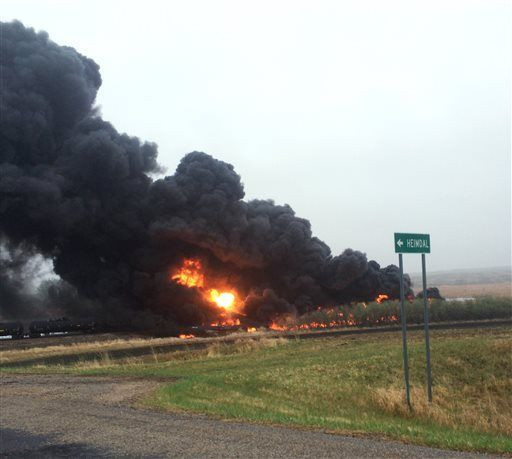Another North Dakota oil train fire renews fears about 'rolling pipelines'

A second North Dakota oil train explosion is sparking renewed fears about safety measures protecting American populations near railways as trains transport a record amount of crude oil.
The tiny North Dakota town of Heimdal and surrounding farms were evacuated after a train hauling crude derailed and erupted into a wall of flames.The town was filled with black oily smoke as the fire burned all day. Officials haven't determined what caused the 109-car Burlington Northern Santa Fe train to derail. No one was injured. The Federal Railroad Administration is investigating.
The incident was at least the ninth fiery oil-train derailment in the US and Canada in two years and comes among increasing concern about poor safety protections as the transportation of oil on the nations' rail systems skyrockets.
A record amount of crude oil is rolling down the tracks of America's rail system in aging, puncture-prone cars. The number of rail cars transporting oil has increased from 10,000 in 2008 to 400,000 last year. Some 25 million Americans now live within a one-mile evacuation zone in the event of an oil train derailment. Flaming derailments have occurred in Alabama, Lynchburg, Virginia, and an earlier one in North Dakota, which spilled nearly 500,000 gallons of crude, forcing the town of Casselton to be evacuated. A train explosion in Lac-Mégantic in Quebec in 2013 killed 47 people.
The Heimdal derailment came just days after the US Department of Transportation and Canada's Transport Ministry announced new rules for oil trains, including phasing out older tank cars, adding electronic braking systems and imposing speed limits. But many critics believe that they're inadequate.
"We will continue to see these fiery derailments even with the new regulations in place, because they fail to take sufficient actions to prevent oil trains wrecks," said Jared Margolis, an attorney for the nonprofit Center for Biological Diversity. "As this accident demonstrates, people, wildlife, rivers and lakes will continue to pay the price for the government's failure to take steps to adequately protect us from these dangerous oil trains."
The rules could still be a work in progress, indicated acting federal railroad administrator Sarah Feinberg. "Today's incident is yet another reminder of why we issued a significant, comprehensive rule aimed at improving the safe transport of high hazard flammable liquids," she said, but the agency "will continue to look at all options available to us to improve safety and mitigate risks."
© Copyright IBTimes 2025. All rights reserved.






















